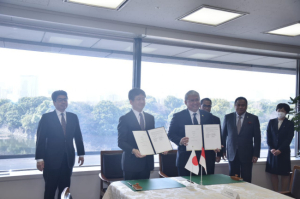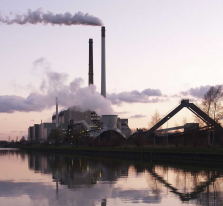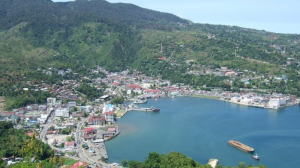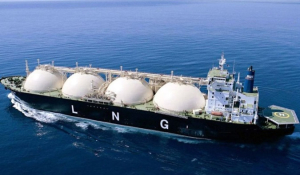JBIC-funded LNG projects harm communities: Report
A report by a coalition of civil society organizations has alleged that a number of global liquefied natural gas (LNG) projects financed by Japan Bank for International Cooperation (JBIC) had impacted the environment and ivelihood of the surrounding communities.
The report entitled “Faces of Impact: JBIC and Japan's LNG financing harms communities and the planet” was compiled by a coalition of civil society organizations, including Friends of Earth Japan, Oil Change International, Australia Conservation Foundation, Greenpeace, and Indonesia Environmental Forum (Walhi).
According to the report, since 2016 or after the Paris Agreement, JBIC has disbursed up to US$18.6 billion for gas project expansion. This figure is four times greater than Japan's contribution to the Green Climate Fund, a financing mechanism that helps developing countries adapt to and mitigate climate change. Worse still, even though the G7 countries have been committed to end funding for fossil energy projects by the end of 2022, JBIC still provides funding for these dirty energy projects of up to US$3.9 billion.
One of the projects funded by JBIC is the US$ 1 billion Donggi-Senoro LNG Project located in Uso Village, Banggai, Central Sulawesi. The project was found to have restricted fishermen's fishing grounds, and reduced the quality and quantity of fish catches. The same is true for the village's coconut, banana, corn and chili harvests.
“Fishermen have experienced a significant drop in income, sometimes even down to one tenth of what it was before, due to the development of the JBIC-funded Donggi Senoro LNG project and the restriction of fishing grounds to nearby waters. In addition, various farming products are also affected by the emissions released by the LNG plant,” Dwi Sawung, Spatial and Infrastructure Campaign Manager for Walhi, said in a statement as quoted on Thursday, October 17, 2024.
In fact, before the Donggi-Senoro LNG Project was built, the surrounding community was able to manage their economy independently. Previously, they could easily catch skipjack only by installing FADs or fishing aids on the coast of the Donggi Senoro LNG Project site. Now, local fishermen are prohibited from fishing in the area.
These impacts have forced the community to demand compensation and jobs from the project manager. However, not only did they refuse to provide compensation, but also fail to prioritize local people to work at the Donggi-Senoro LNG Project as proised. Of the total 570 workers at the project, 90 skilled workers came from outside Central Sulawesi and 480 unskilled workers from Batui and surrounding areas. However, only 25-30 Uso villagers were employed in connection with the project as non-permanent workers through subcontractors, namely as security and cleaning officers.
Similar conditions exist in JBIC-funded LNG projects around the world. In Bangladesh, for example, the Meghnaghat LNG Plant Project has deprived local communities of their livelihoods due to declining fish populations, and burdened Bangladesh with high electricity prices. In Thailand, the Gulf SRC and Gulf Pluak Daeng power plants deprived people of their livelihoods and destroyed biodiversity. In the Philippines, AG&P Linseed LNG Import Terminal violated water pollution and environmental regulations, and displaced residents.
“The Japanese government and JBIC continue to fund new gas projects around the world claiming that they will promote development. However, as this report clearly shows, the reality is quite the opposite. Communities face severe health impacts, loss of livelihoods, declining marine biodiversity, rising electricity costs, and even security threats and challenges. Japan and JBIC must publicly commit to no longer fund new fossil gas projects without exception,” Hiroki Osada, Campaigner of Friends of the Earth Japan, said.
“JBIC has poured US$18.6 billion into gas finance since the Paris Agreement. Japan clearly has enough funds that could be redirected to support a comprehensive, rapid and equitable phase-out of fossil fuels. It is time for rich countries like Japan to pay up and take responsibility for their contribution to the climate crisis instead of continuing gas expansion that exacerbates climate change and harms people and ecosystems,” said Makiko Arima, an Oil Change International (OCI) Senior Campaigner.
Tag
Already have an account? Sign In
-
Start reading
Freemium
-
Monthly Subscription
30% OFF$26.03
$37.19/MonthCancel anytime
This offer is open to all new subscribers!
Subscribe now -
Yearly Subscription
33% OFF$228.13
$340.5/YearCancel anytime
This offer is open to all new subscribers!
Subscribe now






